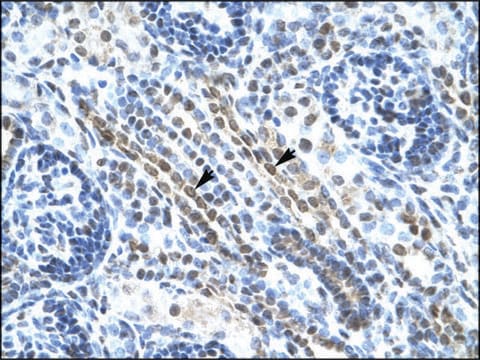SAB1400494
Anti-ANKRD1 antibody produced in mouse
IgG fraction of antiserum, buffered aqueous solution
Sinonimo/i:
Anti-ALRP, Anti-C-193, Anti-CARP, Anti-CVARP, Anti-MCARP, Anti-bA320F15.2
About This Item
Prodotti consigliati
Origine biologica
mouse
Coniugato
unconjugated
Forma dell’anticorpo
IgG fraction of antiserum
Tipo di anticorpo
primary antibodies
Clone
polyclonal
Forma fisica
buffered aqueous solution
Reattività contro le specie
human
tecniche
indirect immunofluorescence: suitable
western blot: 1 μg/mL
N° accesso UniProt
Condizioni di spedizione
dry ice
Temperatura di conservazione
−20°C
modifica post-traduzionali bersaglio
unmodified
Informazioni sul gene
human ... ANKRD1(27063)
Categorie correlate
Descrizione generale
Immunogeno
Sequence
MMVLKVEELVTGKKNGNGEAGEFLPEDFRDGEYEAAVTLEKQEDLKTLLAHPVTLGEQQWKSEKQREAELKKKKLEQRSKLENLEDLEIIIQLKKRKKYRKTKVPVVKEPEPEIITEPVDVPTFLKAALENKLPVVEKFLSDKNNPDVCDEYKRTALHRACLEGHLAIVEKLMEAGAQIEFRDMLESTAIHWASRGGNLDVLKLLLNKGAKISARDKLLSTALHVAVRTGHYECAEHLIACEADLNAKDREGDTPLHDAVRLNRYKMIRLLIMYGADLNIKNCAGKTPMDLVLHWQNGTKAIFDSLRENSYKTSRIATF
Azioni biochim/fisiol
Stato fisico
Esclusione di responsabilità
Non trovi il prodotto giusto?
Prova il nostro Motore di ricerca dei prodotti.
Codice della classe di stoccaggio
10 - Combustible liquids
Punto d’infiammabilità (°F)
Not applicable
Punto d’infiammabilità (°C)
Not applicable
Certificati d'analisi (COA)
Cerca il Certificati d'analisi (COA) digitando il numero di lotto/batch corrispondente. I numeri di lotto o di batch sono stampati sull'etichetta dei prodotti dopo la parola ‘Lotto’ o ‘Batch’.
Possiedi già questo prodotto?
I documenti relativi ai prodotti acquistati recentemente sono disponibili nell’Archivio dei documenti.
Il team dei nostri ricercatori vanta grande esperienza in tutte le aree della ricerca quali Life Science, scienza dei materiali, sintesi chimica, cromatografia, discipline analitiche, ecc..
Contatta l'Assistenza Tecnica.





